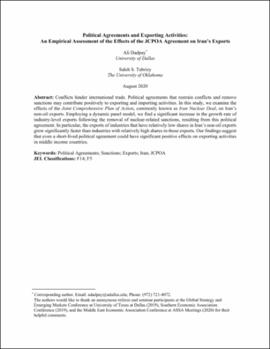| dc.contributor.author | Dadpay, Ali | |
| dc.contributor.author | Tabrizy, Saleh S. | |
| dc.date.accessioned | 2021-05-12T14:32:23Z | |
| dc.date.available | 2021-05-12T14:32:23Z | |
| dc.date.issued | 2020-08 | |
| dc.identifier.citation | Dadpay, A., Tabrizy, S.S. Political Agreements and Exporting Activities: An Empirical Assessment of the Effects of the JCPOA Agreement on Iran’s Exports. Comp Econ Stud 63, 147–180 (2021). https://doi.org/10.1057/s41294-020-00136-x | en_US |
| dc.identifier.uri | https://hdl.handle.net/11244/329526 | |
| dc.description.abstract | Conflicts hinder international trade. Political agreements that restrain conflicts and remove sanctions may contribute positively to exporting and importing activities. In this study, we examine the effects of the Joint Comprehensive Plan of Action, commonly known as Iran Nuclear Deal, on Iran’s non-oil exports. Employing a dynamic panel model, we find a significant increase in the growth rate of industry-level exports following the removal of nuclear-related sanctions, resulting from this political agreement. In particular, the exports of industries that have relatively low shares in Iran’s non-oil exports grow significantly faster than industries with relatively high shares in those exports. Our findings suggest that even a short-lived political agreement could have significant positive effects on exporting activities in middle-income countries. This is a postprint of the published article. | en_US |
| dc.language | en_US | en_US |
| dc.subject | Political Agreements | en_US |
| dc.subject | Sanctions | en_US |
| dc.subject | Exports | en_US |
| dc.subject | Iran | en_US |
| dc.subject | JCPOA | en_US |
| dc.title | Political Agreements and Exporting Activities: An Empirical Assessment of the Effects of the JCPOA Agreement on Iran’s Exports | en_US |
| dc.type | Article | en_US |
| dc.description.peerreview | Yes | en_US |
| dc.identifier.doi | 10.1057/s41294-020-00136-x | en_US |
| ou.group | College of Arts and Sciences::Department of Economics | en_US |
